| Listing 1 - 10 of 18 | << page >> |
Sort by
|
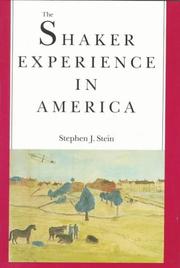
ISBN: 0300051395 Year: 1992 Publisher: New Haven London Yale University Press
Abstract | Keywords | Export | Availability | Bookmark
 Loading...
Loading...Choose an application
- Reference Manager
- EndNote
- RefWorks (Direct export to RefWorks)
#SBIB:316.331H450 --- #SBIB:97G --- Morfologie van de godsdiensten: religieuze bewegingen en sekten --- Geschiedenis van Noord-Amerika --- Shakers --- United States --- History --- United Society of Believers in Christ's Second Appearing --- Millennial Church --- Alethians --- United Society of Shakers --- United Society of Believers --- Believers of Chosen Land --- Shaker Society --- United Society --- Church of Christ's Second Appearing --- Order of Young Believers in the United Society --- United Society of Believers in Christ's Second Coming --- United Society of True Believers --- Church of Christ --- History. --- United Society of Shakers, Sabbathday Lake, Inc.
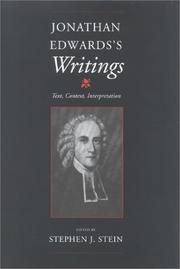
ISBN: 0585102635 9780585102634 0253330823 Year: 1996 Publisher: Bloomington (IN) : Indiana University Press,
Abstract | Keywords | Export | Availability | Bookmark
 Loading...
Loading...Choose an application
- Reference Manager
- EndNote
- RefWorks (Direct export to RefWorks)
Edwards, Jonathan, --- أدوردس، يوناثان --- Edwards (jonathan)
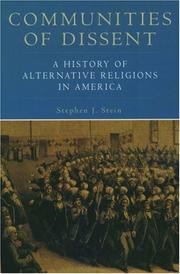
ISBN: 1283097869 9786613097866 0199760667 9780199760664 9781283097864 0195158253 9780195158250 6613097861 0197738664 Year: 2003 Publisher: Oxford: Oxford university press,
Abstract | Keywords | Export | Availability | Bookmark
 Loading...
Loading...Choose an application
- Reference Manager
- EndNote
- RefWorks (Direct export to RefWorks)
Alternative religious groups have had a profound influence on American history-they have challenged the old and opened up new ways of thinking about healing, modes of meaning, religious texts and liturgies, the social and political order, and the relationships between religion and race, class, gender, and region. Virtually always, the dramatic, dynamic history of alternative religions runs parallel to that of dissent in America. Communities of Dissent is an evenhanded and marvelously lively history of New Religious Movements in America. Stephen J. Stein describes the evolution and structure of alternative religious movements from both sides: the critics and the religious dissenters themselves. Providing a fascinating look at a wide range of New Religious Movements, he investigates obscure groups such as the 19th-century Vermont Pilgrims, who wore bearskins and refused to bathe or cut their hair, alongside better-known alternative believers, including colonial America's largest outsider faith, the Quakers; 17th- and 18th-century Mennonites, Amish, and Shakers; and the Christian Scientists, Jehovah's Witnesses, Black Muslims, and Scientologists of today. Accessible and comprehensive, Communities of Dissent also covers the milestones in the history of alternative American religions, from the infamous Salem witch trials and mass suicide/murder at Jonestown to the positive ways in which alternative religions have affected racial relations, the empowerment of women, and American culture in general.
Cults --- Sects --- Denominations, Religious --- Religions, Modern --- Religious denominations --- Religions --- Alternative religious movements --- Cult --- Cultus --- Marginal religious movements --- New religions --- New religious movements --- NRMs (Religion) --- Religious movements, Alternative --- Religious movements, Marginal --- Religious movements, New --- History. --- United States --- Religion. --- History --- Religion --- Cults - United States - History --- Sects - United States - History --- United States - Religion --- popular religion --- peace movements --- Colonial America --- Apocalyptic traditions --- healers --- Occultists --- sectarians --- 20th century sects --- 20th century cults --- Alternative religions in America
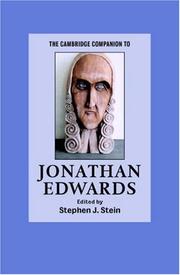
ISBN: 0521618053 0521852900 9780521618052 9780521852906 9781139001298 Year: 2007 Publisher: Cambridge Cambridge University Press
Abstract | Keywords | Export | Availability | Bookmark
 Loading...
Loading...Choose an application
- Reference Manager
- EndNote
- RefWorks (Direct export to RefWorks)
284.972 --- 2 EDWARDS, JONATHAN --- 284.972 Gemeinschaftsbewegung. Erweckungsbewegung. Religieus Reveil --- Gemeinschaftsbewegung. Erweckungsbewegung. Religieus Reveil --- 2 EDWARDS, JONATHAN Godsdienst. Theologie--EDWARDS, JONATHAN --- Godsdienst. Theologie--EDWARDS, JONATHAN --- Edwards, Jonathan, --- أدوردس، يوناثان
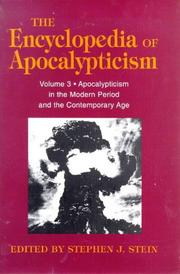
ISBN: 0826410731 Year: 1998 Publisher: New York The Continuum Publishing Company
Abstract | Keywords | Export | Availability | Bookmark
 Loading...
Loading...Choose an application
- Reference Manager
- EndNote
- RefWorks (Direct export to RefWorks)
Book
ISBN: 1139195417 Year: 2012 Publisher: Cambridge : Cambridge University Press,
Abstract | Keywords | Export | Availability | Bookmark
 Loading...
Loading...Choose an application
- Reference Manager
- EndNote
- RefWorks (Direct export to RefWorks)
This history shows complex relationships among American religious communities as well as the growth of distinctive theological ideas and religious practices. The result of this development in North America is a rich religious culture that includes representatives of most of the world's religions. Volume 3 examines the religious situation in the United States from the end of the Second World War to the second decade of the twenty-first century, contextualized in the larger North American continental context.
Book
ISBN: 1139016865 Year: 2012 Publisher: Cambridge : Cambridge University Press,
Abstract | Keywords | Export | Availability | Bookmark
 Loading...
Loading...Choose an application
- Reference Manager
- EndNote
- RefWorks (Direct export to RefWorks)
Book
ISBN: 1139195425 Year: 2012 Publisher: Cambridge : Cambridge University Press,
Abstract | Keywords | Export | Availability | Bookmark
 Loading...
Loading...Choose an application
- Reference Manager
- EndNote
- RefWorks (Direct export to RefWorks)
Book
ISBN: 1139817523 1139001299 Year: 2007 Publisher: Cambridge : Cambridge University Press,
Abstract | Keywords | Export | Availability | Bookmark
 Loading...
Loading...Choose an application
- Reference Manager
- EndNote
- RefWorks (Direct export to RefWorks)
Long recognized as 'America's theologian', Jonathan Edwards (1703-1758) is seen as instrumental in the Great Awakening of the 1740s that gripped much of New England and that laid the groundwork for an American Protestant religious identity. This Cambridge Companion offers a general, comprehensive introduction to Jonathan Edwards and examines his life and works from various disciplinary perspectives including history, literature, theology, religious studies, and philosophy. The book consists of seventeen chapters written by leading religious scholars, historians and literary critics on Edwards' life, work, and legacy. The Companion will be an invaluable aid to teachers and scholars and will be imminently accessible to those just encountering Edwards for the first time.
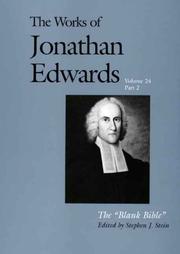
ISBN: 9780300109313 0300109318 9780300109313 0300109318 Year: 2006 Publisher: New Haven: Yale university press,
Abstract | Keywords | Export | Availability | Bookmark
 Loading...
Loading...Choose an application
- Reference Manager
- EndNote
- RefWorks (Direct export to RefWorks)
In 1730, Jonathan Edwards acquired a book-like, leather-bound manuscript containing an interleaved printed edition of the King James Version of the Bible. Over the next three decades, Edwards proceeded to write in the manuscript more than five thousand notes and entries relating to biblical texts (though paradoxically he called the manuscript his “Blank Bible”). Only a fraction of the entries has ever been published. This volume presents a complete edition of the “Blank Bible” accompanied by an informative introduction, multiple appendices, and an extensive index.This volume, perhaps the most unusual in Edwards’ oeuvre, brings to light more clearly than ever before the full scope of his creative investment in biblical studies.
| Listing 1 - 10 of 18 | << page >> |
Sort by
|

 Search
Search Feedback
Feedback About UniCat
About UniCat  Help
Help News
News